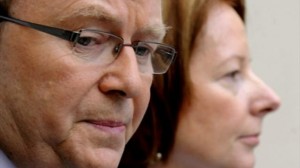 It’s been an extraordinary day in Australian politics, where Julia Gillard has called a leadership vote for Monday in the latest showdown of a long-simmering feud with foreign minister and former prime minister Kevin Rudd that has undermined the Labor Party almost since it took over government in 2007.
It’s been an extraordinary day in Australian politics, where Julia Gillard has called a leadership vote for Monday in the latest showdown of a long-simmering feud with foreign minister and former prime minister Kevin Rudd that has undermined the Labor Party almost since it took over government in 2007.![]()
Rudd, who’s been visiting Washington, DC, resigned as foreign minister today in a press conference outside of Washington’s Willard Hotel, announced he will return immediately to Australia, indicating that he would stand for the leadership against Gillard:
I do not believe that Prime Minister Gillard can lead the Australian Labor Party to success in the next election. That is a deep belief, I believe it’s a belief also shared right across the Australian community…. Their overall argument to me is that they regard me as the best prospect to lead the Australian Labor Party successfully to the next elections, to save the Australian Labor Party and those next elections and to save the country from the ravages of an Abbott government.
For too long, Kevin Rudd has been putting his own self-interest ahead of the interests of the broader labour movement and the country as a whole, and that needs to stop. He sought to tear down the 2010 campaign, deliberately risking an Abbott prime ministership, and now he undermines the government at every turn.
Face to face, it’s so clear. Rudd is driven by anger. It’s the juice in the machine. He is a hard man to read because the anger is hidden by a public face, a diplomat’s face. Who is the real Kevin Rudd? He is the man you see when the anger vents. He’s a politician with rage at his core, impatient rage.
Against this background, Gillard announced her intention to run for the leadership; it became clear that Rudd would not have the support to defeat Gillard and, accordingly, he stepped down as Prime Minister on June 24, 2010.
Gillard called a snap election to solidify her mandate as Labor leader, but doubts about the ability of the Labor party to govern itself (let alone Australia) and the ongoing unpopularity of Labor over asylum, the economy, the mining tax and the carbon trading policy plagued Gillard’s campaign. Gillard was also troubled by a truculent Rudd, who spent most of the campaign recovering from gull bladder surgery and then, campaigning locally for reelection in his local state of Queensland. Labor won reelection very narrowly with 50.12% of the vote against 49.88% for the resurgent Coalition under new leader Tony Abbott. Gillard remained Prime Minister only with support from among six independent MPs.
3 thoughts on “Rudd-Gillard showdown looming in Australia”